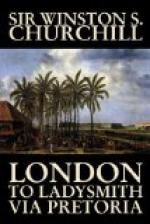On the way back I talked with the volunteer. He was friendly and communicative. ‘Durban Light Infantry,’ he said; ’that’s my corps. I’m a builder myself by trade—nine men under me. But I had to send them all away when I was called out. I don’t know how I’m going on when I get back after it’s over. Oh, I’m glad to come. I wish I was in Ladysmith. You see these Dutchmen have come quite far enough into our country. The Imperial Government promised us protection. You’ve seen what protection Colenso got; Dundee and Newcastle, just the same; I don’t doubt they’ve tried their best, and I don’t blame them; but we want help here badly. I don’t hold with a man crying out for help unless he makes a start himself, so I came out. I’m a cyclist. I’ve got eight medals at home for cycling.’
‘How will you like a new one—with the Queen’s head on it?’
His eye brightened.
‘Ah,’ he said, ’I should treasure that more than all the other eight—even more than the twenty-mile championship one.’
So we rattled back to Estcourt through the twilight; and the long car, crowded with brown-clad soldiers who sprawled smoking on the floor or lounged against the sides, the rows of loopholes along the iron walls, the black smoke of the engine bulging overhead, the sense of headlong motion, and the atmosphere of war made the volunteer seem perhaps more than he was; and I thought him a true and valiant man, who had come forward in time of trouble quietly and soberly to bear his part in warfare, and who was ready, if necessary, to surrender his humble life in honourably sustaining the quarrel of the State. Nor do I care to correct the impression now.
CHAPTER VI
DISTANT GUNS
Estcourt: November 10, 1899.
When I awoke yesterday morning there was a strange tremor in the air. A gang of platelayers and navvies were making a new siding by the station, and sounds of hammering also came from the engine shed. But this tremor made itself felt above these and all the other noises of a waking camp, a silent thudding, a vibration which scarcely seemed to constitute what is called sound, yet which left an intense impression on the ear. I went outside the tent to listen. Morning had just broken, and the air was still and clear. What little wind there was came from the northwards, from the direction of Ladysmith, and I knew that it carried to Estcourt the sound of distant cannon. When once the sounds had been localised it was possible to examine them more carefully. There were two kinds of reports: one almost a boom, the explosion evidently of some very heavy piece of ordnance; the other only a penetrating whisper, that of ordinary field guns. A heavy cannonade was proceeding. The smaller pieces fired at brief intervals, sometimes three or four shots followed in quick succession. Every few minutes the heavier gun or guns intervened. What was happening? We could only try to guess, nor do we yet know whether our guesses were right. It seems to me, however, that Sir George White must have made an attack at dawn on some persecuting Boer battery, and so brought on a general action.




